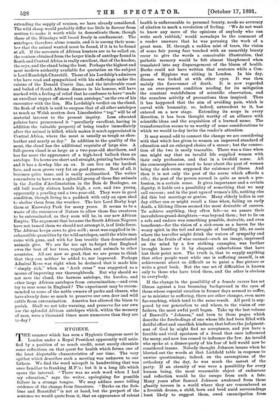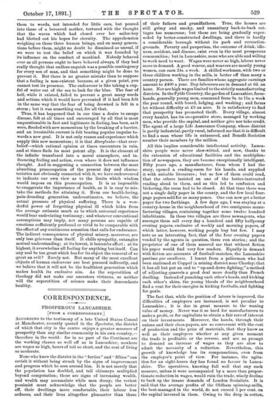HYGIENE.
THE summer which has seen a Hygienic Congress meet in London under a Royal President apparently well satis- fied by a position of so much credit, must surely chronicle some reflections on that quest for health which forms one of the least disputable characteristics of our time. The very epithet which describes such a meeting was unknown to our fathers. 'We find the word misspelt in handwriting that was once familiar to franking M.P.'s ; but it is a long life which spans the interval. " There was no such word when I had my education," says the writer, apologising for possible failure in a strange tongue. We may adduce more telling evidence of the change from literature. "Burke on the Sub- lime and Beautiful" is not at band, but the purport of the sentence we would quote from it, that an appearance of robust
health is unfavourable to personal beauty, needs no accuracy of citation to mark a revolution of feeling. We do not want to know any more of the opinions of anybody who can write such rubbish,' would nowadays be the comment of a reader unaware that he was perusing the work of a great man. If, through a sudden mist of tears, the vision of some fair young face touched with an unearthly beauty recur to give the words a conceivable illustration, that pathetic memory would be felt almost blasphemed when translated into any disparagement of the bloom of health. Burke could not have written that sentence while a Con- gress of Hygiene was sitting in London. In his day, disease was looked at with other eyes. It was then mainly the forerunner of death. It is now regarded as an ever-present condition needing for its mitigation the constant watchfulness of scientific observation, and the ceaseless activity of precautions thus inspired. Thus it has happened that the aim of avoiding pain, which is coeval with humanity, or, indeed, antecedent to it, has entered on a new stage. Extending its scope in every direction, it has been thought worthy of an alliance with scientific ideas and the acquisition of a learned name. The transformation seems to us worthy of some considerations to which we would to-day invite the reader's attention.
It may sound odd to connect the change we are considering with that which has given to women an improved standard of education and an enlarged choice of a career ; but the connec- tion of the two is easily traceable. There was a time when one might say that an invalid life supplied women with their only profession, and that in a twofold sense. All the commonplaces one used to hear about the post of woman being the sick-room supposed the existence of illness. And then it is not only the post of the nurse which affords a role ; the post of the person nursed is quite as much a pro- fession, in a certain sense. It gives importance and a certain dignity, it holds out a possibility of something that we may call success ; and in the past ages of women's life, nothing else did this but marriage or genius. Many elderly ladies in our day either can or might recall a time when, failing an early death, a lifelong illness seemed the most desirable of careers. To achieve anything, they often felt—so we assure their incredulous grand-daughters—was beyond them ; but to lie on a sofa and endure was something possible, desirable, and even beneficent—for the vision of a sick-room as a haven for the weary spirit in the toil and struggle of bustling life, an oasis where the traveller might drink the waters of sympathy and feed on the fruits of wise counsel—such an image, impressed on the mind by a few striking examples, was further brought home to it by eloquent exhortations that have lost their point now. The truth is, that to supply anything that other people want while one is suffering oneself, is an achievement about as difficult as to paint a fine picture or write a great book. But the one set of difficulties is known only to those who have tried them, and the other is obvious to everybody.
If the change in the possibility of a female career has set illness against a less becoming background in the eyes of those whose especial vocation in former days seemed to suffer, or to minister to suffering, there are other changes, even more far-reaching, which tend to the same result. All peril is sup- posed by our generation to end where, to the vision of our fathers, the most awful peril began. Take up the last volume of Boswell's " Johnson," and turn to those pages which describe the forebodings of one whose life had been filled with dutiful effort and unselfish kindness, that before the judgment- seat of God he might find no acceptance, and you have a forcible and vivid specimen of a dread that once influenced the many, and now has ceased to influence the few. An invalid who spoke at a dinner-party of his fear of hell would now 1)4 considered insane. Nobody thought Johnson insane when he blurted out the words at that Lichfield table in response to unwise questionings ; indeed, on the assumptions of the orthodoxy of the day, he was much the sanest of the party. If an eternity of woe were a possibility for every human being, the most reasonable object of endeavour and reflection would be the escape from such a fate. Many years after Samuel Johnson awakened from these ghastly terrors in a world where they are remembered as a feverish dream, a child, born and bred amid surroundings , least likely to suggest them, owed emancipation from them to words, not intended for little ears, but poured into those of a bereaved mother, tortured with the thought that the waves which had closed over her sailor-boy had blotted out his hopes for eternity. The apprehension weighing on these three human beings, and on many genera- tions before them, might no doubt be dismissed as unreal, if we were to teat the belief on which it was founded by its influence on the conduct of mankind. Nobody behaved ever as all persons ought to have behaved always, if they bad really thought that endless anguish was a possible contingency for every son of man, and that something might be done to prevent it. But there is no greater mistake than to suppose that a feeling is non-existent because, at a given point, you cannot test its presence. The endeavour is like taking a cup- ful of water out of the sea to look for the blue. The fear of bell, while it existed, failed to prevent a great many words and actions which it would have prevented if it had been felt in the same way that the fear of being drowned is felt in a storm ; but it was something real, for all that.
Thus, it has happened that in our time a desire to escape disease, felt at all times and encouraged by all that is most unquestionable in fact and legitimate in feeling, has been, as it were, flooded with new momentum by the breaking of a barrier, .and an irresistible current is felt bearing popular impulse to- wards a new goal. It is not only reason and experience which supply this new momentum ; it is that Aberglaube—that over- belief—which rational opinion at times encounters in vain, and at times finds its most potent ally. It is the element of the infinite transfused into a moral atmosphere, and in- fluencing feeling and action, even where it does not influence thought. And in suggesting a connection between the most absorbing preoccupation of the present day and charac- teristics not obviously connected with it, we have endeavoured to indicate our own view as to the limits which wisdom would impose on this preoccupation. It is as impossible to exaggerate the importance of health, as it is easy to mis- take the methods for attaining it. Even our health-loving, pain-dreading generation underestimates, we believe, the actual pressure of physical suffering. There is a won- derful power of forgetting physical ill which hides from the average estimate much as to which universal experience would bear undeviating testimony; and whatever conventional assumptions may imply, not many persons are capable of emotions sufficiently profound or vivid to be comparable with the effect of any continuous sensation that calls for endurance. The indirect consequences of physical misery, moreover, are only less grievous than itself. It chills sympathy, entangles mutual understanding; at its lowest, it benumbs effort ; at its highest, it overwhelms all feeling for anything but itself. Can -any zeal be too great which has for its object the removal of so great an evil? Surely not. But many of the most excellent 'objects of human endeavour are best pursued indirectly, and we believe that it will not be the healthiest generation which makes health its exclusive aim. As the superstition of theology did not make our ancestors virtuous, so neither will the superstition of science make their descendants healthy.



































 Previous page
Previous page